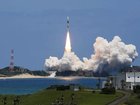Japan on Wednesday successfully launched a probe destined for a distant asteroid on a six-year mission, just weeks after a European spacecraft's historic landing on a comet.
 Full Story
Full Story
Mastodons, the giant lumbering cousins of mammoths and elephants, likely disappeared from Alaska and the Yukon long before humans arrived across the Bering Land Bridge from Asia, researchers said Monday.
Mastodons were once believed to have roamed the snowy Arctic region alongside the first human colonists some 13,000 to 14,000 years ago, but new evidence suggests they disappeared tens of thousands of years earlier and were not hunted to extinction.
 Full Story
Full Story
In the more than two decades since world leaders first got together to try to solve global warming, life on Earth has changed, not just the climate. It's gotten hotter, more polluted with heat-trapping gases, more crowded and just downright wilder.
The numbers are stark. Carbon dioxide emissions: up 60 percent. Global temperature: up six-tenths of a degree. Population: up 1.7 billion people. Sea level: up 3 inches. U.S. extreme weather: up 30 percent. Ice sheets in Greenland and Antarctica: down 4.9 trillion tons of ice.
 Full Story
Full Story
Oil company TransCanada suspended construction of a terminal on a major pipeline along the St. Lawrence River Monday after Canadian authorities classified a nearby population of beluga whales as "endangered."
The arctic white whale, with its distinctive spherical forehead and smiling mouth, is present in and around Cacouna, Quebec where the terminal is planned.
 Full Story
Full Story
NASA's multi-billion dollar Orion capsule is poised for its first test launch Thursday, in a demonstration flight that aims to propel it higher than any spacecraft meant to carry humans in 40 years.
After launching from Cape Canaveral, Florida atop a powerful Delta IV rocket at 7:05 am (1205 GMT), the unmanned spacecraft should circle the Earth twice and reach a height of 3,600 miles (5,800 kilometers), more than 15 times the altitude of the orbiting International Space Station.
 Full Story
Full Story
The sprawling power station that hums and coughs along this coast in Indonesia is labeled as a Japanese contribution to the global fight against climate change.
But the Cirebon plant, built with Japanese financing two years ago, is not powered by the sun, the wind or any kind of renewable energy. It's fueled by the biggest source of carbon pollution in the energy system: Coal.
 Full Story
Full Story
His corn and bean fields ravaged by drought, Nicaraguan farmer Leonel Sanchez Hernandez grudgingly found a new harvest: tarantulas.
He gets a little over a dollar for each of the hairy critters, which breeders sell overseas as pets.
 Full Story
Full Story
Small Pacific island states and powerful foreign fishing nations are heading for a showdown next week over management of the world's largest tuna fishery.
The islands want the annual meeting of the influential Western and Central Pacific Fisheries Commission (WCPFC) in Samoa to limit fishing for bigeye, a tuna prized by sashimi markets in Asia, America and Europe.
 Full Story
Full Story
Energized by new targets set by China and the United States, the world's top climate polluters, U.N. global warming talks resume Monday with unusual optimism despite evidence that human-generated climate change is already happening and bound to get worse.
Negotiators from more than 190 countries will meet in the Peruvian capital for two weeks to work on drafts for a global climate deal that is supposed to be adopted next year in Paris. Getting all countries aboard will be a crucial test for the U.N. talks, which over two decades have failed to reduce the greenhouse gas emissions blamed for global warming.
 Full Story
Full Story
Japan on Monday will launch a space probe on a six-year mission to mine a distant asteroid after the event was postponed due to bad weather, officials said.
Hayabusa2 is now scheduled to blast off aboard Japan's main H-IIA rocket from Tanegashima Space Center in southern Japan at 1:22 pm (0422 GMT), the Japan Aerospace Exploration Agency said Saturday.
 Full Story
Full Story



